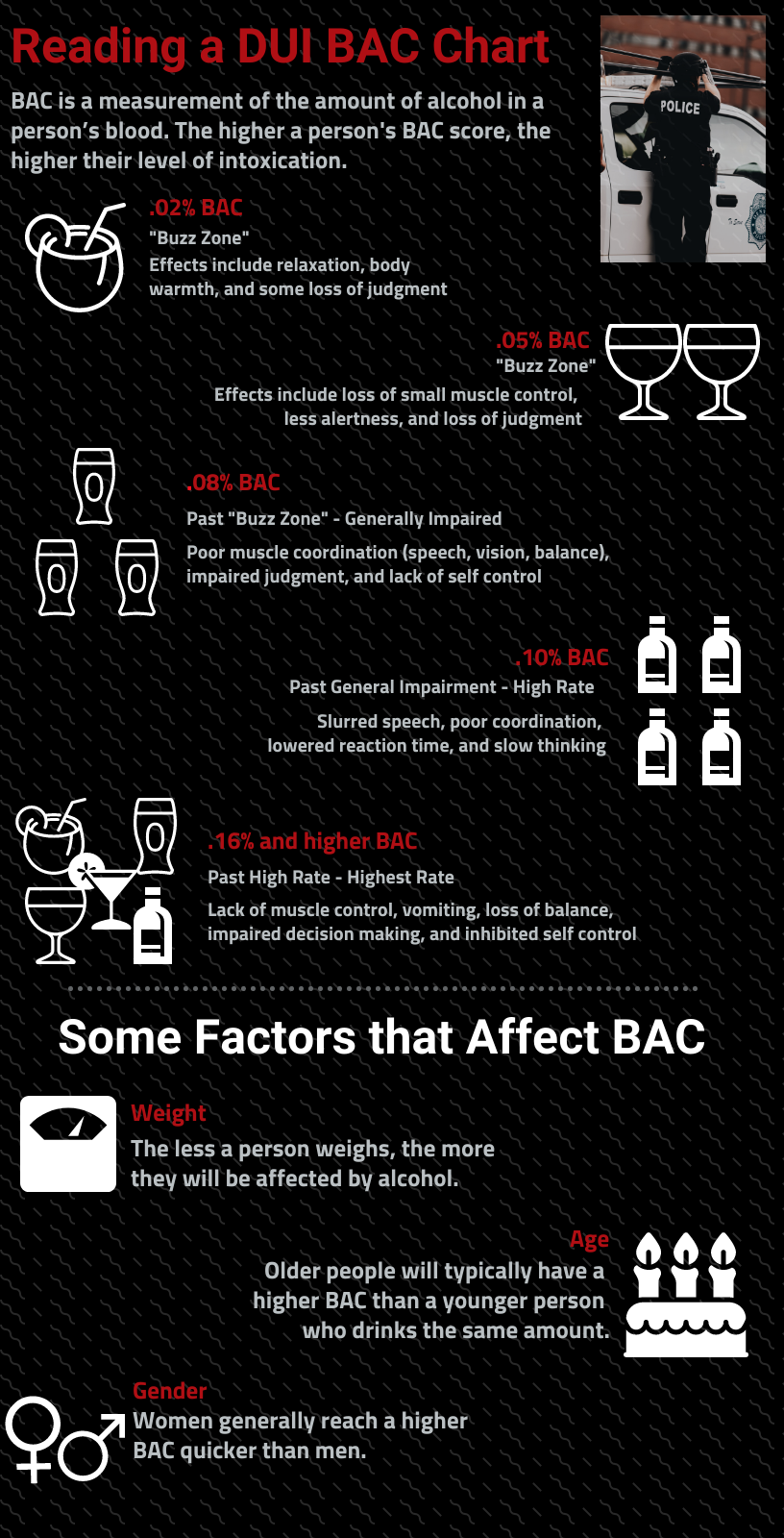Blood alcohol content (BAC), also known as blood alcohol concentration, is a measurement of the amount of alcohol in a person’s blood. BAC is measured as a mass per volume, with the final result given as a percentage, and the higher the BAC, the more intoxicated the person is.
In Pennsylvania, the penalties for DUI increase as your BAC increases. In addition to the number of previous DUI convictions, the penalties for DUI in Pennsylvania depend on whether you’re considered:
- Generally Impaired: .08-.099% BAC
- High Rate: .10-.159% BAC
- Highest Rate: .16% and above BAC
In every state, the legal BAC limit for non-commercial drivers over the age of 21 is .08%, which means there is .8 grams of alcohol present in your body per 1,000 grams of blood. A BAC of .08 roughly equates to 4 drinks (one drink equals a 1.5 oz. shot of 80-proof liquor) within a one-hour period for a 180-pound male. Keep in mind, however, that many other factors can affect your actual BAC, and the above figure is provided only as a point of reference.
What Affects BAC?
Some factors that affect BAC include:
- Age
- Gender
- Weight
- Percentage body fat
- How quickly you were drinking
- How strong the drinks were
- Metabolism
- Medications
- Food
- Carbonation
- Diabetes and other medical conditions
Understanding How BAC Affects Your Mind and Body
It is important to distinguish BAC from tolerance. Tolerance refers to a person’s ability to control themselves while under the influence of drugs or alcohol. BAC on the other hand, is a measurement of the amount of alcohol present in your blood. So even if you think you are fine to drive, but your BAC says otherwise, you can be arrested for DUI. This false sense of confidence is how many DUIs occur.
The Buzz Zone

A BAC below .06% and below is often called the “Buzz Zone.” At this level BAC, the drinker will experience increased energy, confidence, sociability, and a general feeling of well-being and euphoria.
A BAC at .06% is the peak of the Buzz Zone. After this, the drinker’s energy levels begin to drop and he begins to suffer from delayed reaction times.
A BAC over .06% is the end of the Buzz Zone, when the depressant effects of alcohol begin to take hold, and the drinker first begins to appear drunk. Signs include:
- A loss of balance and coordination
- Poor decision making abilities
- An inability to concentrate
- Slurred speech
Once you have passed the Buzz Zone, you will no longer be able to return to it.
Blood Alcohol Testing In Pennsylvania
If you are pulled over on suspicion of driving under the influence, the first test the officer will ask you to perform is known as a field sobriety test. These tests are designed to measure how intoxicated you are, but sober drivers also may fail this test.
After the field sobriety test, you may be asked to submit to a chemical test. Pennsylvania has an implied consent law, which means that if an officer has probable cause to believe you were driving under the influence and arrests you, then you are required by law to take a blood, breath, or urine test to determine your BAC. If you refuse any of these tests, then your license will automatically be suspended for 12 months, in addition to any other penalties associated with a DUI conviction.
How Blood Alcohol Is Tested
Age, gender, weight, body fat, metabolism and more factor into your blood alcohol level.The most accurate way to determine BAC is by obtaining a blood sample. However, blood samples are not always practical, which means that most BAC tests are conducted using a Breathalyzer or by collecting urine samples.
A Breathalyzer uses a sensor to detect the concentration of alcohol present in a person’s breath coming from deep lung air. While not as accurate as a blood test, the results can be used against you in court as long as the test was administered properly.
Contact a Pennsylvania DUI Defense Attorney Today
There are certain factors that can cause the BAC level to register higher than it actually is on a Breathalyzer. An experienced Pennsylvania DUI attorney can discuss these factors with you and help determine whether you can challenge the Breathalyzer results. For skilled representation against DUI charges, contact the Kellis Law Firm today.